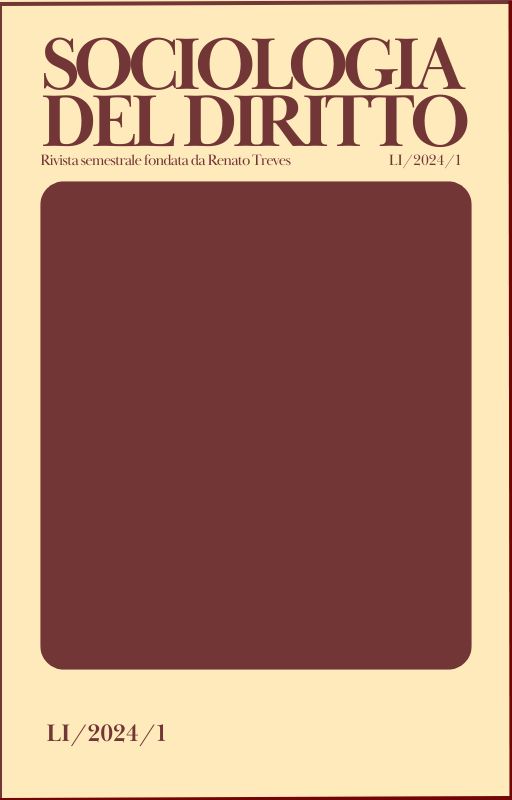Essays
My hands are tied! Disciplinary Measures And Police Officers In Italian Cinema and TV Series
Published 2024-06-12
Keywords
- Disciplinary Measures,
- Crime Cinema and TV Series,
- Rebel Officer,
- Creator of Law,
- Subversion
Copyright (c) 2024 Luca Martignani

This work is licensed under a Creative Commons Attribution-ShareAlike 4.0 International License.
Abstract
This essay focuses on the disciplinary measures applied to police officers in Italian crime cinema and TV series. Such measures are represented as narrative devices that show an anti-hero in conflict with society. From the point of view of the plot, the character takes on almost subversive connotations, positioning himself towards society as a potential creator of law. By analysing excerpts from films and TV series, the reasons why this legal creation is not realized are examined. Officers’ behavior rather indicates the critical potential of the detective genre, which departs from the perspective of amusement to offer insights into the relationship between the ethics of principles and responsibilities. The adoption of disciplinary measures offers the image of a legal system that seeks to stabilize social tensions. The officers’ reinstatement into service is the culmination of a narrative plot and a reflexive mechanism that the law develops in order to redefine its boundaries by accepting a certain degree of discretion by the officer subjected to disciplinary measures.
Downloads
Download data is not yet available.
References
- Barberis, P., Skelton, A., (2013), Loyalty Under Stress: Three Response Studies Examined. Police Studies: The International Review of Police Development, 9, pp. 63-73.
- Boido, Annalisa, (2023), Sub 270-bis, in Ronco, M., Romano, Codice penale ipertestuale, Torino, UTET, 2012. Aggiornato da C. Leotta in One Legale, 15 febbraio 2023.
- Boltanski, L., (2009), Énigmes et complots. Une enquête à propos d’enquêtes, Paris, Gallimard.
- Bourdieu, P., (1994) Raisons pratiques. Sur la théorie de l’action, Paris, Éditions du Seuil; trad. it., (2009), Ragioni pratiche, Bologna, il Mulino.
- Bourdieu, P., (2012), Sur l’Etat, Paris, Gallimard; trad. it., (2023), Sullo Stato, Milano, Feltrinelli.
- Campesi, G., (2024), Che cos’è la polizia, Roma, DeriveApprodi.
- Curti, R., (2006), Italia odia. Il cinema poliziesco italiano, Torino, Lindau.
- Durkheim, E., (1893), De la division du travail sociale, Paris, Alcan; trad. it., (1962), La divisione del lavoro sociale, Milano, Comunità.
- Fabini, G., Gargiuglo, E., Tuzza, S., (2023), Polizia. Un vocabolario dell’ordine, Milano, Mondadori.
- Heinich, N., (2021), La sociologia alla prova dell’arte. Interviste con Julien Ténédos, Milano-Udine, Mimesis.
- Horkheimer, M., Adorno, T.W., (1944) Dialektik der Aufklärung; trad. it., (2010), Dialettica dell’Illuminismo, Torino, Einaudi.
- Luhmann, N., (1969), Soziologische Aufklärung, trad. it., (2022), Illuminismo sociologico, Milano, Jouvence.
- Luhmann, N, (1975), Macht, trad. it., (2010), Potere e complessità sociale, Milano, Il Saggiatore.
- Manchette, J.P., (2006), Chroniques, Paris, Rivages/Noir.
- Pannarale, L. (2020), La verità degli avvocati: un’indagine sul cinema italiano. Sociologia del diritto, 47, 3, pp. 33-51.
- Pasolini, P., (1975), Scritti corsari, Milano, Garzanti.
- Prandini, R., Teubner, G., (2022), La (auto)sovversione del diritto: ambiguità e paradossi del sistema immunitario della società, Milano, FrancoAngeli.
- Romeo, A., (2023), Bad Lawyers? Filosofia dell’etica legale nella cultura cinematografica hollywoodiana. Sociologia del diritto, 50, 2, pp. 69-99.
- Scerbanenco, C., (2018), Il fabbricante di storie. Vita di GiorgioScerbanenco, Milano, La nave di Teseo.
- Scerbanenco, G., (1966), Venere privata, Milano, Feltrinelli.
- Selmini, R., (2017) Da Kurt Wallander a Salvo Montalbano. Poliziae poliziotti nella letteratura europea contemporanea, Roma, Carocci.
- Simon, W., (1996), Should Lawyers Obey the Law?. WM &Mary L. Rev., 38, pp. 217-253.
- Valverde, M., (2010) To the Hard-Boyled Detective to the Pre-Crime Unit, in C. Greer, ed., Crime and Media: A Reader, London, Routledge, pp. 311-323.
- Weber, M., (1919), Politik als Beruf; trad. it., (2004), La politica come professione, Torino, Einaudi.
- Wittgenstein, L., (1953) Philosophische Untersuchungen; trad. it., (1993), Ricerche filosofiche, Torino, Einaudi.

